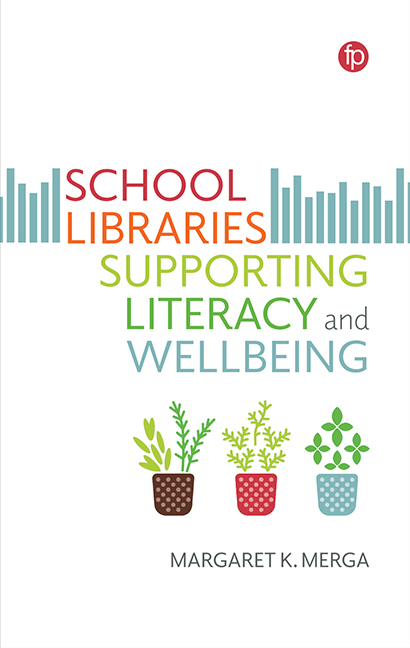Book contents
- Frontmatter
- Contents
- List of Tables
- Acknowledgements
- Abbreviations
- Introduction
- 1 What Do School Library Professionals Contribute to Student Learning and Support? A Focus on Australia and the UK
- 2 School Libraries and Reading Engagement for Literacy
- 3 Librarians Supporting Struggling Literacy Learners Beyond the Early Years
- 4 School Libraries and Reading Engagement for Student Wellbeing
- 5 School Libraries, Health Resourcing and Information Literacy
- 6 Librarians Creating Environments for Reading and Wellbeing
- 7 Challenges to Visibility and Advocacy for School Libraries and Staff
- Conclusions and Directions for Future Research
- Appendix 1 Background and Methods of My Research Projects
- Appendix 2 A Place to Get Away from It All: Five Ways School Libraries Support Student Wellbeing
- Index
2 - School Libraries and Reading Engagement for Literacy
Published online by Cambridge University Press: 21 April 2022
- Frontmatter
- Contents
- List of Tables
- Acknowledgements
- Abbreviations
- Introduction
- 1 What Do School Library Professionals Contribute to Student Learning and Support? A Focus on Australia and the UK
- 2 School Libraries and Reading Engagement for Literacy
- 3 Librarians Supporting Struggling Literacy Learners Beyond the Early Years
- 4 School Libraries and Reading Engagement for Student Wellbeing
- 5 School Libraries, Health Resourcing and Information Literacy
- 6 Librarians Creating Environments for Reading and Wellbeing
- 7 Challenges to Visibility and Advocacy for School Libraries and Staff
- Conclusions and Directions for Future Research
- Appendix 1 Background and Methods of My Research Projects
- Appendix 2 A Place to Get Away from It All: Five Ways School Libraries Support Student Wellbeing
- Index
Summary
Think about all the ways you have communicated with others over the last couple of days. Almost certainly, this has involved a combination of reading, writing, listening and speaking skills that you may take for granted.
For example, that text message response you sent from your phone drew on your writing skills, but you also needed good reading comprehension to understand the meaning behind the message you were responding to. Add differences in writing styles, literacy skills, first language structures and norms, and discourse features as just some of the many complex factors that shape the message that is sent, and how it is received. This is the reality of the tacit complexity underpinning every communication you are involved in.
Furthermore, we have linguistic features such as sarcasm, which must be detected in order for the recipient to understand the communication intends the very opposite of what is professed; we don't even always say or write what we mean. Technological advances have not diminished the need for strong literacy skills, and it can be argued that the need for students to have strong literacy is actually growing in contemporary times.
Literacy is one of the most important skills for contemporary communication and optimisation of an individual's academic, vocational and social opportunities (e.g. Lane & Conlon, 2016). In their report on literacy and numeracy skills and labour market outcomes for the Productivity Commission in Australia, Shomos and Forbes (2014) contended that higher literacy skills ‘are associated with better labour market outcomes (employ - ment and wages)’ (p. vi), and therefore raising the literacy levels within a population delivers economic benefits.
The practical barriers of low adult literacy may be poorly understood by those with functional literacy, and our recent research explored how literacy interventions in adulthood can support these lifelong learners to master skills that literate adults take for granted, such as reading street signs and filling out forms required in the course of a work role (Ferguson & Merga, 2021). Low literacy can exclude us from vital health communications that can impact on both individual and community health, such as government-issued health information during the pandemic.
- Type
- Chapter
- Information
- School Libraries Supporting Literacy and Wellbeing , pp. 33 - 56Publisher: FacetPrint publication year: 2022
- 1
- Cited by



